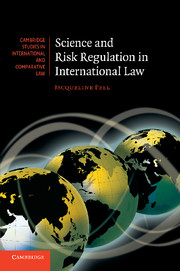Book contents
- Frontmatter
- Contents
- Preface
- Acknowledgements
- 1 Introduction: science and risk regulation in international law
- 2 Global risk governance and its legitimacy
- 3 Scientific rationality and risk in international law
- 4 Competing risk regulatory paradigms: sound science and the precautionary principle
- 5 Science and WTO regulation of SPS risk
- 6 Case studies of science and risk regulation in international law
- 7 Democratising global risk governance
- 8 What role for science in international risk regulation?
- Index
- CAMBRIDGE STUDIES IN INTERNATIONAL AND COMPARATIVE LAW
- References
3 - Scientific rationality and risk in international law
Published online by Cambridge University Press: 10 January 2011
- Frontmatter
- Contents
- Preface
- Acknowledgements
- 1 Introduction: science and risk regulation in international law
- 2 Global risk governance and its legitimacy
- 3 Scientific rationality and risk in international law
- 4 Competing risk regulatory paradigms: sound science and the precautionary principle
- 5 Science and WTO regulation of SPS risk
- 6 Case studies of science and risk regulation in international law
- 7 Democratising global risk governance
- 8 What role for science in international risk regulation?
- Index
- CAMBRIDGE STUDIES IN INTERNATIONAL AND COMPARATIVE LAW
- References
Summary
Introduction
In areas of international law concerned with issues of risk, rules and processes of global governance with significant behind-the-border impacts are of growing importance. The potential reach of global risk governance into the domestic regulatory sphere of sovereign states has made questions over legitimacy increasingly pertinent for the broader acceptance of international risk regulation. This is particularly so in the context of an emerging (world) ‘risk society’ that posits the control of risk as a central concern of modern government.
Drawing on analogies with national risk regulation, expertise in the form of scientific knowledge is often looked to as a means for strengthening the legitimacy claims of global decision-making processes dealing with highly technical and complex matters of health and environmental risk. Acceptance of science as a sound foundation for international risk regulation is underpinned by the perception that scientific knowledge offers an objective and universally applicable basis for rational decision-making, as well as the close association between notions of risk, and the scientific understanding of them, that has developed in contemporary times. Indeed, science and technology can be said to have provided the foundations of ‘a dynamic, homogenizing global culture’; one that now creates ‘continuously intense levels of interaction between and across territorial communities’.
- Type
- Chapter
- Information
- Science and Risk Regulation in International Law , pp. 58 - 110Publisher: Cambridge University PressPrint publication year: 2010



